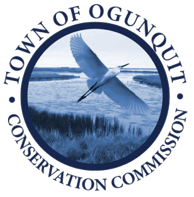 Ogunquit Beach hosts more of our federally and state protected piping plovers than ever before, a good sign of a healthy beach with few predators. At best estimate we had 18 adults, 15 chicks and 3 fledglings – chicks with their flying feathers but not ready to fly on our beach. These are amazing birds, nesting in the sand, with the chicks having to feed themselves as soon as they are hatched. Watch for these cute white, gray, and black tiny guys next time you’re on the beach; they will be with us till August or so before heading south, though their kids may stick around for a while longer.
Ogunquit Beach hosts more of our federally and state protected piping plovers than ever before, a good sign of a healthy beach with few predators. At best estimate we had 18 adults, 15 chicks and 3 fledglings – chicks with their flying feathers but not ready to fly on our beach. These are amazing birds, nesting in the sand, with the chicks having to feed themselves as soon as they are hatched. Watch for these cute white, gray, and black tiny guys next time you’re on the beach; they will be with us till August or so before heading south, though their kids may stick around for a while longer.
A few years ago, Ogunquit hired a beach cleaner who came every day whether the beach needed it or not. The beach cleaner often didn’t do a whole lot to actually clean up the beach, but he would lump the seaweed in piles and plop it down near the surf line where it eventually either washed out or washed back in. His raking often made the beach harder to walk on. He quit last year and the town leased beach cleaning and raking equipment that we now own. That means we can use this whenever needed, rather than everyday.
Having heavy equipment on the beach, including trucks, is not good for the interstitial beach life, part of our complex ecosystem; our beach will be healthier and in the long run, the town will save money.
 I love fireworks – who doesn’t? When I was a kid, my dad would buy us little stuff – Chinese firecrackers, ladyfingers, sparklers, snakes and something a little fancier – a helicopter or small Roman candle. When my kids were little, I would buy them a similar package of fun stuff and we would set them off in the back yard, so it comes as a shock to learn that fireworks can be toxic for water and air and not great for our pets. That’s a pretty low blow – but it’s only once a year, right? You just have to clean up all the cool blown up stuff so it doesn’t enter the environment more than it already has.
I love fireworks – who doesn’t? When I was a kid, my dad would buy us little stuff – Chinese firecrackers, ladyfingers, sparklers, snakes and something a little fancier – a helicopter or small Roman candle. When my kids were little, I would buy them a similar package of fun stuff and we would set them off in the back yard, so it comes as a shock to learn that fireworks can be toxic for water and air and not great for our pets. That’s a pretty low blow – but it’s only once a year, right? You just have to clean up all the cool blown up stuff so it doesn’t enter the environment more than it already has.
